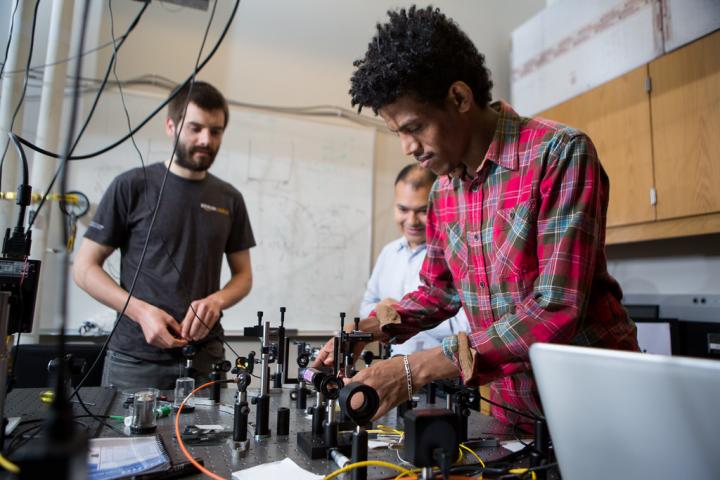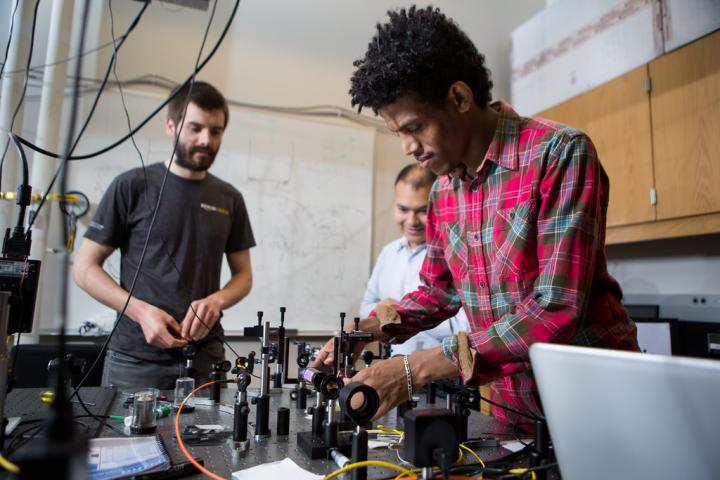
Credit: Matt Hagen/UW Clean Energy Institute
The University of Washington is home to a new national center of excellence for research, education and training in materials science. The Molecular Engineering Materials Center is funded by a $15.6 million, six-year grant from the National Science Foundation as part of its highly competitive Materials Research Science and Engineering Center (MRSEC) program. The UW center is a partnership among UW faculty from the College of Arts & Sciences, the College of Engineering, the Clean Energy Institute (CEI) and the Molecular Engineering & Sciences Institute (MolES).
The new center builds on the UW's record of innovative, collaborative and cross-disciplinary research in the materials sciences, and on a legacy of timely institutional and state investments in materials research at the UW. Initial research will focus on nanocrystals and thin films — toward goals such as developing new materials for applications in clean energy, photonics and quantum computing.
"The primary goal of the UW MRSEC is to empower the next generation of science and engineering leaders," said center director and UW chemistry professor Daniel Gamelin. "This will involve engaging and supporting students and postdoctoral researchers — and giving them the research and educational experiences, training and cross-disciplinary mentorship that they will need to forge careers on the cutting edge of materials science."
The center will embark on new research and training endeavors to:
- Pursue so-called "moonshot" projects, which are research endeavors with potentially high payoff, but are generally beyond the feasibility of smaller research grants awarded to individual professors.
- Implement new cross-disciplinary training and mentorship programs for doctoral students and postdoctoral researchers, including opportunities to conduct research with the center's industrial and international partners, and with partners at Pacific Northwest National Laboratory and at other National Laboratories run by the U.S. Department of Energy.
- Broaden educational and research opportunities for UW students and researchers, including advanced training on new equipment purchased with center funds.
- Expand outreach and mentorship efforts to high school students from underrepresented minorities to encourage them to pursue science, technology, engineering and math (STEM) education as undergraduates.
- Implement comprehensive outreach efforts to recruit military veterans at the UW and at local community colleges into research and education for STEM careers.
- Provide support for additional doctoral and postdoctoral researchers.
The center's inaugural team of 15 faculty come from a variety of disciplines across engineering and the physical sciences. In addition to their home departments in the College of Engineering and the College of Arts & Sciences, 10 are also faculty members in the CEI and 11 in the MolES. This diverse cohort reflects the center's goal to foster novel and innovative collaborations across traditionally separate disciplines.
The center will make use of existing research and education space across the UW campus, including in the Molecular Engineering & Sciences Building. The CEI and the MolES, both of which are headquartered in that building, will provide access to equipment for center research and training.
The center's outreach activities — both within the UW and around the region — emphasize education and training for materials science careers. Each year it will host a Research Experiences for Undergraduates program for students from around the country to conduct research with a UW faculty member during the summer. In addition, center scientists will mentor pre-college students from underrepresented minority groups, providing support and resources to help prepare them for college and encourage them to pursue STEM education. In an entirely new endeavor, the center also will set up programs to engage veterans in center research, very few of whom pursue STEM education and careers.
"With this NSF support, the center will bring new opportunities in STEM education to groups that are underrepresented in STEM careers," said UW professor of materials science and engineering Christine Luscombe, who is the center's executive director for education and outreach. "Programs like these are expanding access to science."
The center will focus on two broad research areas, in nanocrystals and thin films.
The first goal, co-led by Gamelin and Luscombe and including eight initial faculty members, is to pursue new approaches to engineer defects in nanocrystals such as semiconductor quantum dots. Though "defects" often have a negative connotation, in materials science they are opportunities to create substances with novel and technologically attractive properties. Precisely targeted defects or impurities, for example, could make a substance cool down — rather than heat up — when hit by a laser. These new materials could also lead to products such as solar-concentrating window films that absorb photons from sunlight and shunt them to photovoltaic cells for energy conversion.
The center's other focus is the creation of new ultrathin semiconductor materials with unique properties. This team will include seven initial faculty, and is co-led by associate professor of physics and materials science and engineering Xiaodong Xu and assistant professor of physics and electrical engineering Kai-Mei Fu. This research creates thin sheets of materials — often just one layer of atoms thick — and investigates the unique quantum-mechanical properties revealed when these sheets are layered together. These layered materials could form the basis of new ultrathin semiconductors for applications in clean energy, optoelectronics and other applications. In fact, using this approach, one UW team recently discovered a 2-D magnetic material.
"We chose nanocrystals and ultrathin semiconductors because they promise to yield basic, fundamental and impactful discoveries in materials science," said Gamelin. "And those advances will fuel new innovations and applications in growing industries — from quantum computing to clean energy."
###
Gamelin, Xu and Fu — along with assistant professor of chemistry Brandi Cossairt and electrical engineering professor Scott Dunham — represented the UW team in Washington, D.C., during the final leg of the multi-stage competition for NSF-MRSEC support. Funding for the UW's Molecular Engineering Materials Center began Sept. 1. The NSF supports 20 MRSECs across the nation, and the UW's is one of only two on the West Coast.
For more information, contact Gamelin at [email protected] or 206-685-0901.
Media Contact
James Urton
[email protected]
206-543-2580
@UW
http://www.washington.edu/news/
Original Source
http://www.washington.edu/news/2017/09/25/uw-to-host-15-6m-nsf-funded-center-for-innovation-education-in-materials-science/





